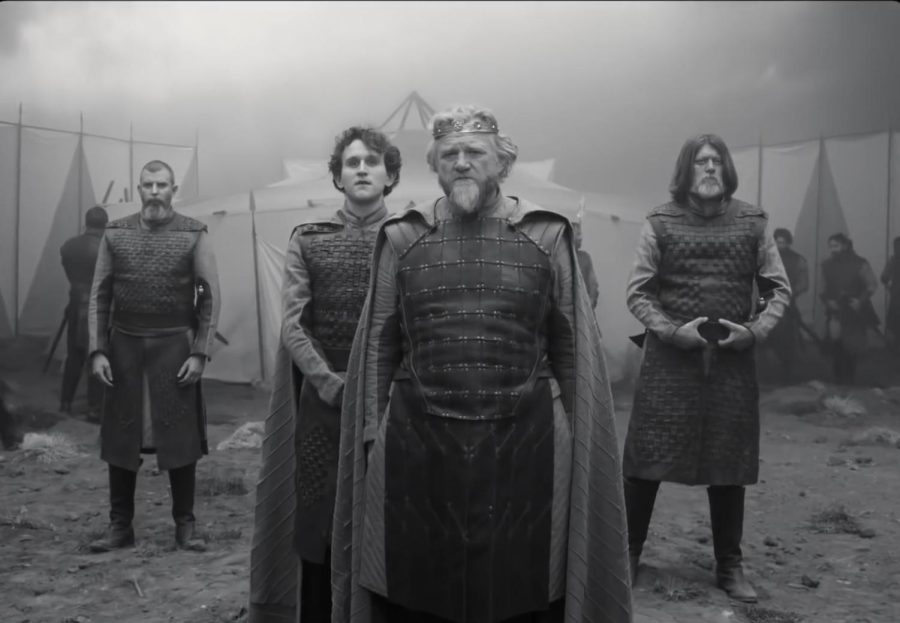‘The Tragedy of Macbeth’ is Shakespearean film at its finest
Joel Coen’s “The Tragedy of Macbeth” is the most I’ve ever enjoyed “Macbeth.” Though it’s one of his most famous plays, Shakespeare’s “Macbeth” is actually my least favorite of his works that I’ve engaged with. And the two film adaptations I’ve seen — Orson Welles’ 1948 “Macbeth” and Akira Kurosawa’s 1957 “Throne of Blood” — are probably my least favorite films in their respective directors’ filmographies (of their films which I have seen). “The Tragedy of Macbeth,” however, can rest comfortably in Coen’s catalogue alongside any of the other great films that he’s made with brother Ethan Coen over the course of his now legendary career. It’s one of the best Shakespearean films I’ve seen and a cinematic feast for any lover of the medium.
Scottish lord Macbeth, newly crowned as Thane of Cawdor in accordance with a witches’ prophecy, now looks to usurp the throne of Scotland itself. The silver-tongued Lady Macbeth goads her husband into committing regicide — having him murder the King Duncan in his sleep and frame the two guardsmen whom she drugged the night before. A crown now upon his head, Macbeth must try and keep it there — all the while staving off and eventually succumbing to the demons of his traitorous deeds.
I saw an article earlier today entitled “Joel Coen’s Shakespeare adaptation looks unlike any other.” I thought this was a pretty amusing title, as all I could think while watching “The Tragedy of Macbeth” was how much the film reminded me of the expressionistic Shakespearean films of Welles — his 1948 “Macbeth” and his 1951 “Othello.”
Stylistically, Coen’s Shakespearean vision has much in common with Welles’ as expressed through those two films. To compare directly to Welles’ “Macbeth,” both cultivate a dreamlike atmosphere — the confined sets and the abundance of fog which aims to conceal them create a sense of inescapable claustrophobia which perfectly accompanies the mental turmoil that overtakes the Lord and Lady Macbeth. Aggressive chiaroscuro bathes characters in brilliant light or masks them completely in darkness, and stunning black-and-white cinematography brings the baroque nightmare of Coen’s adaptation to visceral life.
It’s everything that’s great about Welles’ first two Shakespearean films reinvented with the finesse of a modern master. The aforementioned article features an interview with Stefan Dechant, the film’s production designer. Some of the directors who are mentioned in the article as having influenced the film’s art direction include Danish auteur Carl Theodor Dreyer, as well as the German expressionists F.W. Murnau and Fritz Lang. Watching “The Tragedy of Macbeth,” those influences are evident. After all, Welles’ style is itself derived from the works of those same German expressionists — it would seem Coen and his team went straight to the source.
This is an immensely ethereal film, so much so that it practically removes itself from the historical context of its own story. Characters seem to teleport between scenes. The passage of time is hardly conveyed. The malaffections of each character bleed over into the environments which imprison them — in this case, the brutalist labyrinth of Macbeth’s castle. And as in Welles’ “Othello,” the castle almost becomes a character in and of itself — its twisting, nonsensical corridors seeming to invite the Lord Macbeth further down his own demented path.
The majority of the cast deliver captivating performances in their respective roles — particularly, Denzel Washington and Frances McDormand both shine as Lord Macbeth and Lady Macbeth. I’ve seen the film criticized for struggling to connect with its audience emotionally. To call it emotionally detached is certainly a fair criticism, though it’s one that I would level against most all Shakespearean films which I’ve seen (with Welles’ “Chimes at Midnight” being maybe the only exception). The way to enjoy engaging with this sort of film probably begins with a familiarity with its source material, honestly. As Shakespearean language is often very difficult to make sense of with the same urgency as a film demands, I feel that those who don’t know the story of Macbeth (or Shakespeare generally) will probably enjoy this film a lot less.
But if everything I’ve said regarding the film’s style and mood appeals to you, then I’d highly recommend you check out “The Tragedy of Macbeth.” It’s Shakespearean film at its finest, and hopefully not the last from Joel Coen.













Pat DeVita-Vessa • Jan 18, 2022 at 4:57 pm
I have cherished Shakespeare all my adult life. As a: college student, sociology, and psychology teacher, part of his tapestry is rich with lessons for the ages. As a family therapist, the scope of his words in the context of metaphor or stark reality has helped clarify that their words can slice, call up death and heal. I have the honor of a simple lover of Shakespeare. It is of little matter who created these gifts to the ages. It matters what is shared and belongs to the world. We can find lessons and understanding from the elegant breathing of genius. The importance to all the complex emotions of being human; ain’t it glorious. Sometimes, humans can be strange bedfellows; good on ya! Shakespeare and Joel ; go figure.